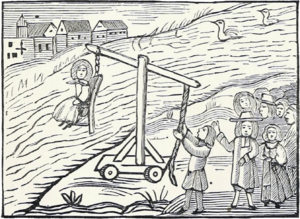The documents that ERO look after are like windows on the past, offering snapshots and vistas of lost worlds. For so many of our predecessors, a brief mention in an official document might be the only occasion that their names were recorded. For many, probably the majority before the introduction of parish registers in 1538, they remain nameless. For anyone considering that the early-modern or medieval eras offered some bucolic ‘golden age’, then it can be a salutary experience to realise that living in our own imperfect age is much preferable.
A recent example of this was when Dr Herbert Eiden, one of the researchers for the People of 1381 Project (http://www.1381.online/) was in the Searchroom chasing up the post revolt lives of some of the rebels, when he happened upon some interesting entries in manorial documents relating to Harlow, the first within a view of frankpledge recorded on 22nd June 1400:
[In the margin:] ‘M[emorandum] viii d‘
Item quod Johannes Wryght iiiid and Alicia Torples iiiid sunt leprosi et manent’ in villa apud le Cherchegate inter comunitat’ ville ad detrimentum vicinorum et contra legem. Ideo ipsi in misericordia. Et preceptum est ballivo et constabular’ amover’ eos extra vill’
This translates as:
Remember 8d
Also [the chief pledges present] that John Wryght, 4d, and Alice Torples, 4d, are lepers and live in the town next to Le Cherchegate inside the community of the town and to the harm of the neighbours. Therefore, they are in mercy. And the bailiff and the constables are ordered to remove them from the town
Alice reappears at the end of a court leet for 4th May 1406 when
‘It is ordered to move outside the town Alice Torples, a certain leper woman, under pain of 20s, until the next court.’
By this time John has disappeared, perhaps he had died. We can only try and imagine the social stigma that Alice must have suffered, let alone the symptoms of leprosy.
Such is the nature of these documents, that directly under this entry appears one that demonstrates one of the features law and order in the medieval world:

‘The bailiff is ordered to make a new ‘cokyngstoll’ [cucking stool] until the next court under pain of 20s.’

Our venerable 1930s OED records ‘cucking stool’ (‘an instrument of punishment formerly in use for scolds, disorderly women, fraudulent tradespeople, etc, consisting of a chair, in which the offender was fastened and exposed to the jeers of the bystanders, or conveyed to a pond or river and ducked’) as being first recorded in thirteenth century. We can only guess how often that was used.
So, there you go, we’re so much better off in our own times and, if you have a moment, do remember poor John Wryght and Alice Torples who didn’t have all the advantages in life that we have.
ERO is very grateful to Dr Herbert Eiden for sharing this fascinating snapshot.
